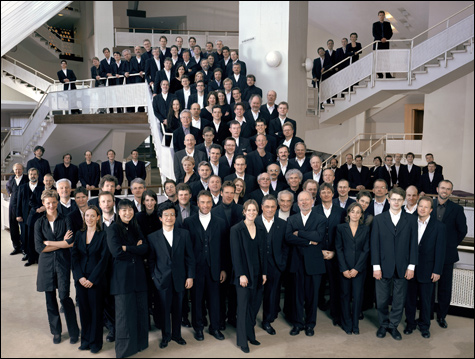Simon Rattle and the Berlin Philharmonic in Mahler’s Das Lied von der Erde
By JEFFREY GANTZ | November 26, 2007

THE WORLD’S GREATEST ORCHESTRA? You’d be hard-pressed to find a better one. |
When what’s arguably the world’s best symphony orchestra, with one of the world’s leading conductors, comes to town to play one of the monuments of Romantic early-20th-century music, with two of the world’s finest singers, expectations run high. It would be too much to say that the Celebrity Series-sponsored performance of Gustav Mahler’s Das Lied von der Erde (“The Song of the Earth”) that Simon Rattle and the Berlin Philharmonic Orchestra brought to Symphony Hall Monday night, with Canadian tenor Ben Heppner and German baritone Thomas Quasthoff, was a disappointment. I can’t recall hearing a live Lied that was this good. But Mahler’s song cycle about taking leave of the Earth has to be a life-and-death experience, and this wasn’t.
Heppner and Quasthoff have sung the piece together in Symphony Hall before, in October 1998 with the Boston Symphony Orchestra, and before that Heppner had sung it here in November 1994 with Anne Sofie von Otter and the BSO under then guest conductor James Levine (who will be doing the piece with Otter and Johan Botha and the BSO in April). Leaning forward, and holding a pocket version of the score in his right hand, as if embarrassed to admit he knew his three songs — the odd-numbered ones, “Das Trinklied vom Jammer der Erde” (“The Drinking Song of the Earth’s Sorrow”), “Von der Jugend” (“Of Youth”), and “Der Trunkene im Frühling” (“The Drunkard in Spring”) — by heart, Heppner was more authoritative than I remember his being in ’98. He had to fight the orchestra, as almost every tenor does in this work, and there were times when Rattle could have done more to help. Against that, Rattle made room for feeling in what many conductors treat as pure extroversion, the tenor as blustery alcoholic. Heppner was a sobered, reflective alcoholic, caressing his “Dunkel ist das Leben, ist der Tod” (“Dark is life, is death”) refrains in “Trinklied,” pausing wistfully before “Ein voller Becher Weins” (“A full goblet of wine”), celebrating the blooming of the Earth in spring. The reflection was physical in the water’s mirror image in “Von der Jugend,” and he made it palpable. When in “Der Trunkene im Frühling” he discovered that spring had arrived, awe colored his voice, and when he raged at the black firmament, he made you recall how back in the “Trinklied” the firmament was eternally blue. The tenor’s last line is “Laßt mich betrunken sein!”; Heppner rolled the “r,” as if to ask what choice the world had given him.
 Related
Related:
Hail and farewell, Conductor karaoke, Voice of authority, More 
- Hail and farewell
The season’s most eagerly awaited (and, with its $187 top ticket price, most expensive) classical concert was not a disappointment.
- Conductor karaoke
Surrealists who work with movement have to manage a demanding slight-of-hand.
- Voice of authority
German baritone Thomas Quasthoff has overcome adversity (his mother took Thalidomide) to become the outstanding German lieder singer of his generation.
- Changing lives
People who love the arts are fond of saying that art changes our lives. Slideshow: The New England Conservatory’s Youth Philharmonic Orchestra visits Venezuela and Brazil
- Loved these but not those
Of the great international orchestras, perhaps the one that's most unfairly overlooked is the London Symphony Orchestra. Yet a handful of the very greatest orchestral performances I've ever heard have been with the LSO.
- Creationists
Simon Rattle and the BPO, Fabio Luisi and the BSO, John Harbison and Emmanuel Music
- John Harbison plus 10
Classical music in Boston is so rich, having to pick 10 special events for this winter preview is more like one-tenth of the performances I'm actually looking forward to.
- Love and loss
Boston’s biggest classical-music story this year was also its saddest.
- Amazing weekend
James Levine’s opening salvo for his year-long Beethoven/Schoenberg series with the Boston Symphony Orchestra couldn’t have been more ambitious: the work that opened Symphony Hall in 1900.
- Open spaces
In my review of the memorable Brahms performances Sir Simon Rattle led with the Berlin Philharmonic Orchestra for the Celebrity Series of Boston last month, I should have mentioned that one decision responsible for the beauty and spaciousness of the orchestral sound was the placement of the first and second violin sections on opposite sides of the stage.
- World music
There’s more to Boston’s classical music scene than the Boston Symphony Orchestra.
- Less

 Topics
Topics:
Music Features
, Entertainment, Gyorgy Kurtag, Gustav Mahler, More  , Entertainment, Gyorgy Kurtag, Gustav Mahler, Gustav Mahler, Bruno Walter, Herbert von Karajan, Berlin Philharmonic, Berlin Philharmonic, Berlin Philharmonic, Symphony Hall, Less
, Entertainment, Gyorgy Kurtag, Gustav Mahler, Gustav Mahler, Bruno Walter, Herbert von Karajan, Berlin Philharmonic, Berlin Philharmonic, Berlin Philharmonic, Symphony Hall, Less 